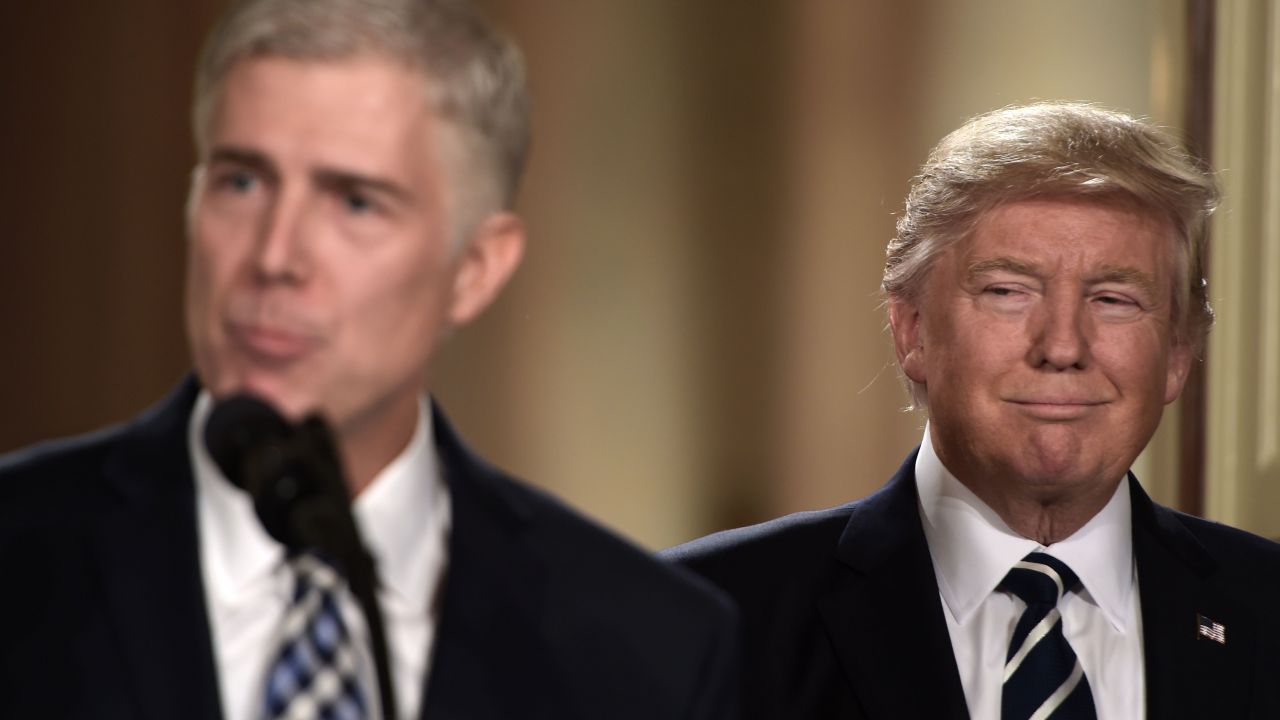
Judge Neil Gorsuch and President Donald Trump at the White House on Jan. 31, 2017. If Gorsuch is confirmed, and the right case comes before the court, Chevron could be seriously endangered. (Photo by Brendan Smialowski/AFP/Getty Images)
This post originally appeared at Mother Jones.
At the Conservative Political Action Conference in February, White House strategist and former Breitbart publisher Steve Bannon laid out what he called the administration’s “three verticals.” These priorities included national security, economic nationalism and “the deconstruction of the administrative state” — in other words, the evisceration of decades’ worth of rules and regulations and the agencies that enforce them.
— Elizabeth Wydra, Constitutional Accountability Center
One of Bannon’s biggest weapons in his battle against the federal bureaucracy? It may be Judge Neil Gorsuch, President Donald Trump’s nominee for the US Supreme Court.
“Judge Gorsuch’s record points strongly in the direction of Bannon’s ominous phrase, toward weakening the ability of agencies to protect our air and water, as well as worker safety and compensation,” says Elizabeth Wydra, president of the liberal Constitutional Accountability Center.
The Trump administration is attacking the regulatory state through executive orders and other executive branch efforts to stymie federal agencies. But Gorsuch — who seems like to be confirmed despite a Democratic filibuster — could help kneecap the system in one stroke if the right case comes up on the docket.
As a federal judge on the 10th Circuit Court of Appeals, Gorsuch has advocated tossing out the primary Supreme Court precedent underpinning federal administrative law. Known as “Chevron deference,” after the high court’s 1984 unanimous ruling in Chevron v. Natural Resources Defense Council, it holds that the courts should defer to federal agencies when it comes to the rules these departments design and implement based on congressional legislation (which sometimes hands the crafting of the nitty-gritty policy details to the government experts). Chevron deference, for instance, allows the Environmental Protection Agency to have scientists help make rules for enforcing the Clean Air Act, and it permits those regulations to be modified in response to new technology or new threats to the environment. But without Chevron, Congress would have to design complex regulations itself and pass new legislation each time these regulations needed to be updated or tweaked.
Gorsuch planted his flag firmly against Chevron in August, when he authored the majority opinion in a case called Gutierrez-Brizuela v. Lynch. In a highly unusual move, he wrote a lengthy concurrence to his own opinion, laying out his arguments for overturning Chevron and reining in the power of executive agencies. The concurrence, which approvingly cited Justices Clarence Thomas and Samuel Alito, as well as Chief Justice John Roberts Jr., reads like a job application for a Republican Supreme Court nominee. It seems to have caught the attention of conservatives who aided Trump in his selection process. Gorsuch’s name did not appear on the short list of potential Supreme Court nominees released by his campaign last May, but he was on the updated list Trump released in September after the Gutierrez opinion came down.
Gutierrez was a sly vehicle for Gorsuch’s attack on Chevron. It has nothing to do with health or safety regulations but rather involves an undocumented immigrant.
The backstory: Around 2004, Hugo Guiterrez-Brizuela entered the United States from Mexico illegally. He stayed for about a year and a half, according to his lawyer, and then he returned home. He came back in January 2006, applying for legal status three years later. At that time, there were two conflicting immigration statutes on the books: One said Gutierrez could apply immediately for a green card. But another law stated that he had to go back to Mexico and wait for 10 years before applying because he had entered the country illegally more than once. In light of the confusion, the 10th Circuit in 2005 decided that the first law trumped the second.
But two years later, the Bush-era Board of Immigration Appeals decided the 10-year bar should be the default position. Because of Chevron, the courts were obliged to defer to the agency’s decision. But the courts have to face a case where the agency’s new position applies before it can become the law of a particular federal circuit. That process took four years in the 10th Circuit. In the meantime, Gutierrez applied for legal status, relying on the old precedent that said he could do so without waiting 10 years. But in 2013, the BIA told him that its ruling — and the 10th Circuit decision creating the new precedent — applied retroactively. He appealed to Gorsuch’s court, and Gorsuch and his colleagues found in his favor. That is, Gorsuch and the other judges said the federal agency did not have the power to retroactively overturn a judicial precedent, and that its decision had violated Gutierrez’s due process rights.
In his majority opinion and his concurrence, Gorsuch argued that the case illustrated how the Chevron doctrine had taken power from judges and placed it in the hands of unelected bureaucrats, in violation of the separation of powers. “We managed to live with the administrative state before Chevron,” he wrote. “We could do it again.”
But the government without Chevron would operate quite differently, as Sen. Dianne Feinstein (D-CA) pointed out when she asked Gorsuch about his views on the subject during his confirmation hearings. She explained that Congress often intentionally asks regulatory agencies to deal with the minutia on how laws should be enforced, citing the measure she helped pass in 2007 to improve corporate fuel economy standards. Feinstein noted that Congress made the rules for 10 years, but after that the law indicated that the science should prevail, leaving further updates to the regulatory agencies. Thanks to that decision, the country’s cars are on their way to achieving 54 miles per gallon. “What’s wrong with that?” she asked.
Gorsuch, a skilled corporate lawyer before his appointment to the bench, deflected questions about his Chevron views by suggesting that he was merely looking out for an undocumented immigrant getting shafted by the system.
“Can a man like Mr. Gutierrez, the least amongst us, be able to rely on judicial precedent on the books, or can he have the ball picked up as he’s going in for the kick?” he asked Feinstein. He made a similar comment the next day to Sen. Orrin Hatch (R-UT), explaining his decision in Gutierrez. “I’m not worried about the large corporations. They have lawyers and money to challenge these things,” he said. “I’m worried about the ordinary American, and sometimes the non-American.”
Bill Hing, founder and volunteer counsel of the Immigrant Legal Resource Center, is dubious. “Although Gorsuch ruled in favor of the immigrant, that was secondary to ruling in favor of separation of powers and judicial authority,” he says. “I definitely would not say that Gorsuch is pro-immigrant based on this decision.”
Gorsuch believes that the power to interpret ambiguous laws should be solely vested with the judiciary, a view that puts him somewhat at odds with the man he was nominated to replace, the late Antonin Scalia, to whom he’s frequently compared. Scalia’s legal philosophy, in fact, was built around the idea that judges needed to be constrained as much as or more so than federal agencies, because the agencies, at least, were politically accountable. “If there is a single theme running through Justice Scalia’s writings on and off the Court, it is the danger of judicial discretion,” observes Cornell University law professor Michael Dorf. “He constantly warned against unelected judges reading their own preferences into the language of either the Constitution or statutes.”
Gorsuch’s position on Chevron is more in line with the views of Chief Justice John Roberts Jr. and Justice Samuel Alito. This means if Gorsuch is confirmed, and the right case comes before the court, Chevron could be seriously endangered. The effect of this would be that already overburdened federal judges, instead of deferring to agencies on regulations covering everything from consumer protection to immigration, would essentially take on the job themselves if these rules become the subject of litigation — a situation Scalia himself once suggested would lead to “chaos.” Much of the process of issuing and enforcing regulations could grind to a halt — an outcome that would surely please Steve Bannon.




